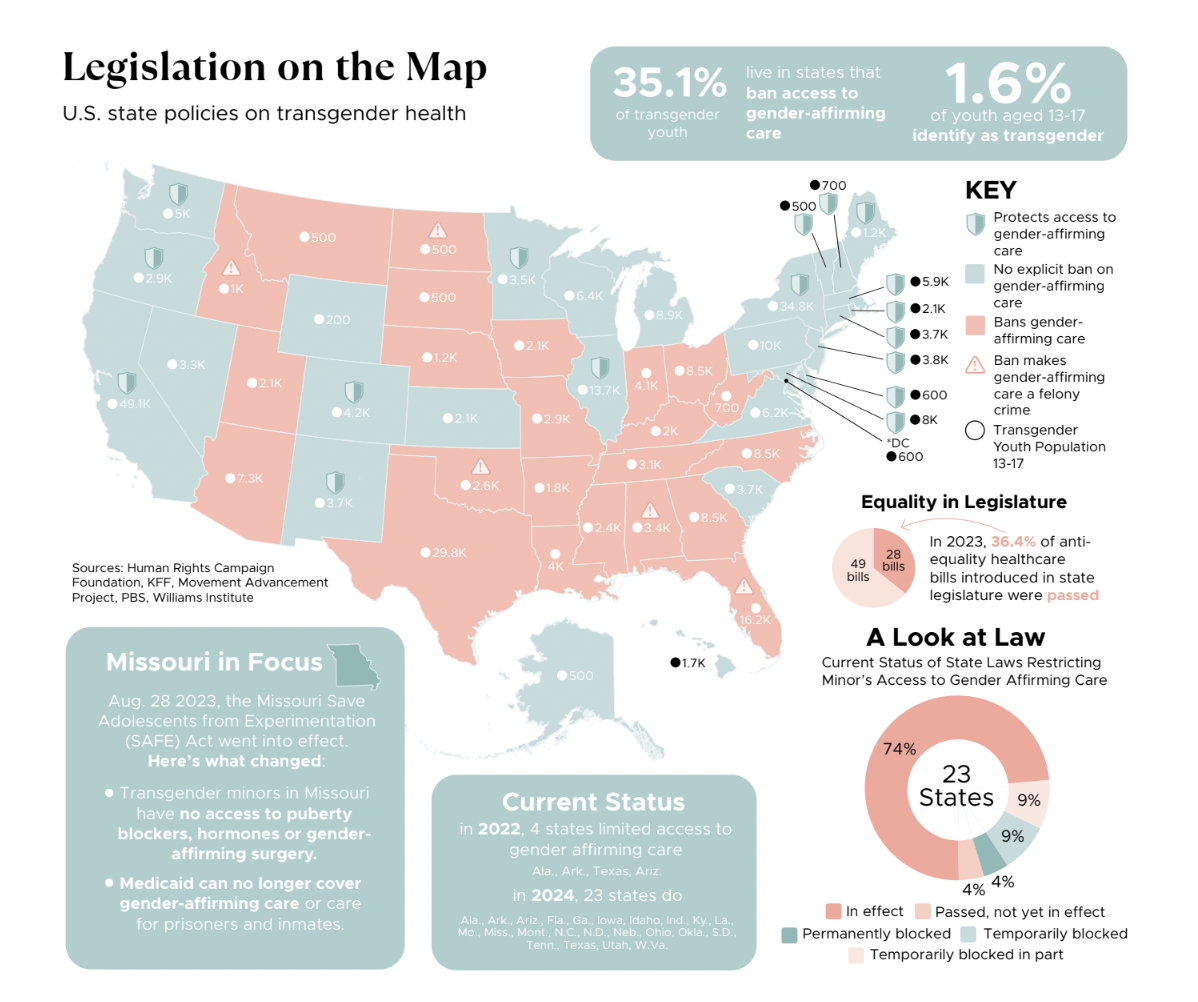Content warning: Suicide, self-harm and trauma
* Indicates a false name to protect the identity of an anonymous student
Aug. 28, 2023, two laws regarding the treatment of transgender individuals went into effect in Missouri. One limits the participation of transgender minors in sports. The other bans them from receiving gender-affirming health care before the age of 18.
Senate Bill 39 forbids both private and public schools from allowing transgender individuals to participate in sports that don’t align with their sex assigned at birth. Any school that violates this act could lose state funding.
Senate Bill 49, called the Missouri Save Adolescents from Experimentation (SAFE) Act, bars doctors from performing gender-affirming surgeries on anyone under the age of 18 and prohibits medical professionals from administering hormones or puberty blockers to minors. However, if said minor had been receiving the treatment prior to Aug. 28, 2023, the obstruction is void. Any doctor that violates this act could lose their medical license.
Senate Bill 49 was introduced after a whistleblower alleged misconduct by the Washington University Transgender Center at St. Louis Children’s Hospital. She claimed that the center rushed minors into receiving gender-affirming care, didn’t fully explain the side effects of hormone replacement therapy prior to treatment and coerced consent.
Multiple former patients of the Washington University Transgender Center have since denied that this malpractice occurred. They claimed to have had multiple appointments before being provided with gender-affirming care, said that they had been informed of the side effects of hormone replacement therapy and had given full and informed consent before treatment began. Independent investigations have identified no misconduct at the Washington University Transgender Center.
Gender-affirming health care refers to medical treatments and procedures intended to align a person’s physical characteristics with their gender identity. These treatments include a range of interventions such as voice therapy, hormone replacement therapy and gender-affirming surgeries. According to the National Institute of Health, the regret rate following gender-affirming surgeries is approximately 1%.
In Missouri, hormone replacement therapy is the most commonly seen form of gender-affirming health care. The treatment is comprised of puberty blockers, which limit the production of testosterone or estrogen, and taking hormones to stimulate masculinizing or feminizing puberty.
Student Response
Amelia Rossi (12) started hormone replacement therapy just weeks before the enactment of Senate Bill 49. She was supplied puberty blockers through the Washington University Transgender Center, but the clinic was shut down before she could build up to a full dose of estrogen.
“For a couple months, I was on an extremely small dose of estrogen and I was a wreck because when your hormones are that out of whack for that long of a time, life does not go okay,” Rossi said. “I’ve transferred to Planned Parenthood in Fairview [Heights, Illinois] and now I’m on the full dose of hormone replacement therapy.”
Like Rossi, student Tyler Sullivan* began hormone replacement therapy prior to the passage of Senate Bill 49. Since the bill’s enactment, his clinic has been shut down. He now has to travel four hours to receive care.
“These laws are not about protecting Missouri youth,” Sullivan said. “[They’re] just to have a sensationalized, hot topic that people can pin themselves to. There’s real consequences because these lawmakers don’t actually know transgender kids. They don’t actually know the consequences of the things that they’re doing.”
Oftentimes, people attempt to show their allyship towards the transgender community by conducting research on the politics of the issue. However, Rossi feels most supported when she is spoken to directly about the transgender experience.
“The biggest thing [people can do] is to talk to trans people and have trans people in [their] life,” Rossi said. “The only real way to sympathize with the experience is to have a personal relationship with someone like that in your life. ”
According to the Center for Disease Control and Prevention, 35% of transgender youth attempt suicide during their teenage years, making them five times more likely to attempt suicide than their cisgender peers. In a study conducted by Diana Tordoff Ph.D., it was found that gender-affirming care results in a 73% reduction in self-harm and suicidal thoughts over a 12 month period.
“I faced a lot of really bad anxiety, depression and suicidal ideation [before my transition],” Rossi said. “That was ongoing for years. With [Senate Bill 49] restricting for other people the resources that I have the privilege of accessing, this bill is going to kill kids.”
As stated by the National Institute of Health, the intention of gender-affirming care is to relieve symptoms of gender dysphoria, a state of severe distress caused by one’s gender identity not matching their sex assigned at birth. As a transgender man, student Henry Cook* has firsthand experience dealing with dysphoria.
“[Have] you ever been in a situation where you are wearing clothes that are really tight fitting and you can’t take them off?” Cook said. “That’s what [dysphoria] feels like. Being able to get [gender-affirming care] is like being able to take off those clothes and getting to wear normal clothes.”
Senate Bill 39 and Senate Bill 49 are not the first pieces of legislation to impact transgender individuals. On a national scale, the Pupil Privacy Rights Amendment prohibits educational facilities from asking for student personal information. Under this, the Ladue School District, along with many others, is disallowed from inquiring about student pronouns.
“We’re just asking for basic human respect,” student Samuel Perry* said. “Treat us like any other individual [and use] our correct pronouns. What we do genuinely does not affect you.”
Parent Response
In 2019, Rabbi Daniel Bogard traveled to Jefferson City, Missouri to protest against Senate Bill 39. As the father of a transgender child, Bogard was motivated by a desire to grant his son the same opportunities as his cisgender peers.
“There were literally more bills last year trying to ban transgender kids from participating in youth athletics than there are transgender kids in Missouri high schools who have asked to participate in Missouri athletics,” Bogard said. “There is no real controversy. It is entirely being done by the Republican legislature in bad faith as a political bludgeon. They believe that getting people to be scared of my kid and disgusted by my kid is a winning political issue for them.”
Since the passing of Senate Bill 39 and Senate Bill 49, David Williams, Rossi’s father, has feared for his daughter’s continued residency in Missouri.
“[Amelia] is actively looking for college options outside the United States,” Williams said. “And then if international really is not on the table, [she’ll choose] schools and states that are more welcoming than Missouri. Missouri seems to be going out of its way to be the biggest and the loudest on the anti-transgender [legislation].”
It’s a common misconception that transgender individuals only resonate with the label due to an underlying mental illness. However, according to the University of Washington School of Public Health, transgender individuals who have received gender-affirming care are 60% less likely to develop depression or other mental health conditions. Like many transgender children from an accepting household, Bogard’s son doesn’t have a history of depression or mental illness.
“[My son] is not a kid [who is] suffering in any way, or [a] confused or sick kid,” Bogard said. “He’s like any other kid. The obsession of our government believing that they should know what his genitals look like and be able to sort him into categories based on what they imagine his genitals look like is disgusting.”
Despite the low regret rate of people who have transitioned, one of the primary arguments against granting minors access to gender-affirming healthcare is that they will feel guilt-ridden about their transition later in their adult life. Nonetheless, many individuals who transitioned past the age of 18 claim that they regret delaying their transition.
“[Transgender people] can’t make the same decisions [to postpone puberty] at 22,” Bogard said. “When you talk to adult trans people who were not given access to puberty blockers and hormones, they often have extensive trauma.”
While Senate Bill 39 and Senate Bill 49 were in the process of passing, Bogard once again traveled to Jefferson City, Missouri to fight against the restrictions. Though many Missouri families with transgender children have resolved to flee the state, Bogard is intent on staying put and advocating for his son.
“There’s no way to truly make transgender people go away because it’s just another way of being human,” Bogard said. “No matter how hard our legislature tries to wipe transgender kids and transgender adults out of existence in our state, there are always transgender people being born every day. It’s a really beautiful, profound way of being a human being.”













Daniel Bogard • Feb 23, 2024 at 11:42 AM
This was ***sooooo*** well done. This sets the gold standard for how journalists should write about trans kids and red states. The NYT should learn from ya’ll. WELL DONE!!!!!